Goal 11: Sustainable Cities and Communities

research impact
For the period 2017-2021
№ relevant publications: 618
№ times cited: 8,318
Key Stats
4 percent of University's budget spent on arts and heritage.
sample Courses
News
Stewardship
Sustainable transportation to campus
The University of Alberta supports active and public transportation in several ways. Bicycle parking, including secure bike lock-up, is available on North Campus, and free showers are available in the Van Vliet Centre. Students and staff can access public transit with the U-Pass attached to their ONEcard.
Each year, University of Alberta staff participate in the Commuter Challenge, a friendly competition to leave the car at home and take public transit, ride a bike or walk to work. Awards are given for the most trips per office or lab and for the highest participation within the office or lab.
Students’ Boulevard Transportation Plan
In 2019, the Office of the University Architect consulted the community on their experiences walking and cycling along 89 Avenue, an important corridor at the heart of North Campus. The resulting plan proposes changes that will make pedestrian access more welcoming, create safer lanes and facilities for cyclists, and improve public transit.
What is Affordable Housing?
The Canada Mortgage and Housing Corporation defines affordable housing as housing that costs less than 30% of a household’s before-tax income.
Affordable Housing Resources for Employees
The University of Alberta connects employees with affordable and subsidized housing resources off-campus, and also provides reimbursements for Moving and Relocation Expenses. Non-Academic Staff Association union members are also eligible for discounts on rental housing with CAPREIT Properties.
Affordable Housing Resources for Students
The University of Alberta connects students with affordable and subsidized housing resources off campus, including housing resources for Indigenous students, as well as international students. The University of Alberta also provides financial support for students’ living expenses in the form of domestic bursaries, international bursaries, emergency bursaries, and the Indigenous Students’ Support Fund.
University-based cultural institutions
The University of Alberta is home to several spaces for sharing art, music, dance, drama and other cultural arts. These institutions include University of Alberta Museums, FAB Gallery, Timms Centre for the Arts, and the Faculty of Music. They often feature the artistic work of students.
Cultural Heritage - National
Sound Studies Institute
The Sound Studies Institute (SSI) provides opportunities to researchers interested in sound studies to engage collaboratively across disciplines and to discover new areas of convergent inquiry. The SSI’s mandate is to preserve and make accessible cultural materials and to increase cross-cultural understanding. Projects undertaken through the iInstitute span local, regional, and national cultural heritage, as well as cultural heritage of displaced communities. Recent projects include: Digitizing the Ancestors, the Virtual Museum of Canadian Traditional Music, and The History of Gospel Music in Western Canada.
Canadian Centre for Ethnomusicology
The Canadian Centre for Ethnomusicology in the department of Music is an archive and research resource which documents musical and cultural traditions locally and internationally. Our collection includes diverse instruments and more than 4000 titles in audio/video recordings. The Centre helps users understand how people use music to connect, express, and create community and identity. It is of value to students and faculty in the social sciences, humanities, education, and fine arts.
Cultural Heritage - Local and Regional
Institute of Prairie and Indigenous Archaeology
The Institute of Prairie and Indigenous Archaeology (IPIA) is an Indigenous-led institute with a commitment to continuing to support Indigenous-engaged archaeological research, developing pedagogical approaches to integrating Indigenous ways of knowing and being into archaeological teaching and training, and changing cultural heritage policies in response to the needs of Indigenous communities in western Canada. IPIA scholars and affiliates are involved in a number of research projects that prioritize Indigenous, community-engaged and community-driven archaeological research in western Canada and beyond.
Cultural Heritage - Displaced Communities
Canadian Indigenous Languages and Literacy Development Institute
The Canadian Indigenous Languages and Literacy Development Institute is dedicated to the revitalization of Canada’s Indigenous languages through documentation, teaching and literacy. They supply tools to Indigenous language activists so that they can better promote, protect, practice and pass on their language.
Kule Folklore Centre
The Kule Folklore Centre studies and preserves Ukrainian and Ukrainian-Canadian language, knowledge, folklore and traditions. The Kule Folklore Centre manages the Bohdan Medwidsky Ukrainian Folklore Archives, which is integral to the understanding of Ukrainian diaspora culture in general, and Ukrainian-Canadian history and culture in particular.
Outreach
Affordable Housing Solutions Lab
The Affordable Housing Solutions Lab empowers citizens to innovate, co-create and develop effective local affordable housing solutions. Funded and mandated by the City of Edmonton, the lab supports the goal of ending poverty in Edmonton within a generation.
We’re Ready! Community Disaster Preparedness
University of Alberta researchers have designed, piloted and published the We’re Ready! Community Disaster Preparedness Workshop. The workshop uses engaging interactive activities to help communities design and implement their own, tailored disaster plans. This helps cities prepare for climate change- related disasters, such as floods and heat waves, and respond to prevent distress, save lives and minimize damage.
Rutherford House
Rutherford House Provincial Historic Site, a beautiful brick mansion on the edge of North Campus and the North Saskatchewan River Valley, was the home of the first premiere of Alberta. This museum now offers visitors a glimpse into the past with costumed interpreters, guided tours and special events.
UAlberta Fine Arts Shows
The Faculty of Arts puts on numerous public performances and exhibitions in art and design, theatre and music on an annual basis. A full listing of performances that took place from April 1, 2020 - March 31, 2021 can be found in this spreadsheet.
Research
Alberta Centre for Sustainable Rural Communities
The Alberta Centre for Sustainable Rural Communities assists rural communities in meeting diverse challenges through fostering constructive dialogue, promoting interdisciplinary and collaborative research, and developing partnerships. The centre provides resources to academic and professional communities, including the Canadian Sustainability Plan Inventory and Boom & Bust, a guide for resource-based communities in Alberta and B.C..
School of Urban and Regional Planning
The School of Urban and Regional Planning offers practical learning experience in community building, with field schools across Canada, a planning studio with real clients, and both undergraduate and graduate programs. The course-based master’s degree focuses on resilient planning and attention to climate change, resource dependency, winter cities, migration and other issues pertinent to Edmonton and Alberta.
NOTABLE STORIES
🔗 Planners delve into their profession’s role in historic inequities
Sandeep Agrawal of the U of A's School of Urban and Regional Planning has written an equity review of zoning bylaws with a recommendation to stop specifically constraining infill in older neighbourhoods.
🔗 The University of Alberta's massive contributions to Edmonton's local arts scene
The university hosts more than 30 public musical performances, plays, visual art exhibits and other art showcases throughout the year. Many performances are part of ongoing programs that happen yearly or monthly, whereas others happen on an ad-hoc basis.
🔗 How the University of Alberta records and preserves cultural heritage
The University of Alberta is committed to recording and preserving cultural heritage at the local, regional and national levels, as well as the cultural heritage of displaced communities.
🔗 How the university is providing affordable housing for its employees
The University of Alberta strives to ensure all of its employees can enjoy a high living standard. That’s why it has taken steps to make housing more affordable for employees.

